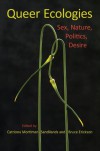3
Followers
14
Following
Simcha-Sophie
a lovely mishmash of opinions interspersed with moments of clarity and vision by a vegan lesbian feminist mystery-loving, history-loving reader and writer.
Currently reading
The More I Owe You: A Novel
The Lifelong Activist: How to Change the World without Losing Your Way
Queer Ecologies: Sex, Nature, Politics, Desire
Odd Girls and Twilight Lovers: A History of Lesbian Life in Twentieth-Century America (Between Men--Between Women)
The Healing Earth
Revolt and Crisis in Greece: Between a Present Yet to Pass and a Future Still to Come
Making A Killing: The Political Economy of Animal Rights
 This book links nonhuman oppression with human oppression; its audience is anarchists and other leftists, as well as activists who take a less-political stance.
This book links nonhuman oppression with human oppression; its audience is anarchists and other leftists, as well as activists who take a less-political stance. We discussed this in book group last week and one of the comments against it is that it does not use feelings as a valid reason for stopping animal exploitation. I agree with this to an extent. There are far too many books promoting animal liberation that ignore the emotional aspect of nonhuman suffering. It would be ideal, I agree, if everyone could feel something for those who suffer. Personally, I cry at just about everything! I definitely come to animal rights from an emotional perspective. Yet I also am not about to throw out any strategy that helps end any oppression. Maybe you're a person who doesn't know how to feel; maybe you operate on logic. Maybe you're like the guy at the Occupy Asheville meeting who works with homeless and hungry humans and becomes very defensive about the mere concept of animal liberation ("humans have to come first"). This is where Torres' book comes in very handy.
He shows how nonhumans suffer just like humans under the oppression of capitalism. I think from reading this that he does, personally, also feel -- he has heart, the suffering he's witnessed hurts him -- but that his strategy is to focus on the oppression of the exploited by exploiter. He takes the political left to task for their complicity in exploiting animals, and he also takes many of the current animal activists groups to tasks.
He suggests that activists have lost our way by depending on the larger groups who simply seek donations and reassure you that they will take your money and act "on behalf of" nonhumans (his focus is primarily PeTA and HSUS). He explores this issue and encourages activists to rely on our own talents and creativity; to not depend on others to do activism for us, and to find common ground with other political organizations who focus on ending exploitation.
Overall, if you consider yourself a leftie politically, you should read this book.If you are a politically-inclined animal activist, you should read this book.








